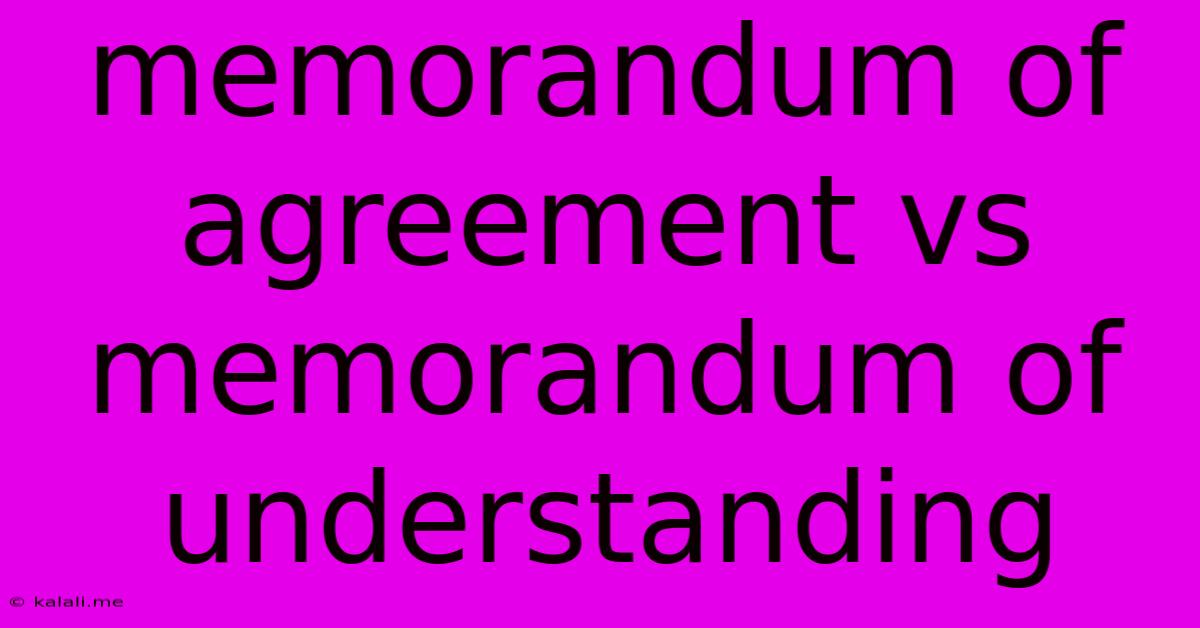Memorandum Of Agreement Vs Memorandum Of Understanding
Kalali
Jun 13, 2025 · 3 min read

Table of Contents
Memorandum of Agreement vs. Memorandum of Understanding: What's the Difference?
Choosing between a Memorandum of Agreement (MOA) and a Memorandum of Understanding (MOU) can be confusing, especially for those new to legal agreements. While both documents outline an understanding between two or more parties, there are key distinctions that determine which is appropriate for your specific situation. This article will clarify the differences between MOAs and MOUs, helping you choose the right document for your needs.
What is a Memorandum of Understanding (MOU)?
A Memorandum of Understanding (MOU) is a non-binding agreement that outlines the terms and conditions of a collaborative effort between two or more parties. It's essentially a statement of intent, expressing a shared understanding and commitment to a particular project or goal. Think of it as a preliminary agreement, a roadmap before embarking on a more formal journey. Key characteristics of an MOU include:
- Non-binding: This means the parties involved are not legally obligated to fulfill the terms outlined in the MOU. It's a flexible agreement, often used in early stages of negotiations or collaborations.
- General terms: MOUs usually cover broad aspects of the agreement, rather than specific details. They focus on the overall goals and principles, leaving finer details for future agreements.
- Framework for future agreements: MOUs frequently serve as a foundation for more legally binding contracts, such as a Memorandum of Agreement.
What is a Memorandum of Agreement (MOA)?
A Memorandum of Agreement (MOA) is a more formal and legally binding agreement than an MOU. It outlines the specific terms and conditions of an agreement, detailing responsibilities, timelines, and consequences of non-compliance. MOAs are often used for projects requiring a higher level of commitment and accountability. Key characteristics of an MOA include:
- Legally binding: Unlike MOUs, MOAs are legally enforceable documents. Parties are obligated to fulfill the terms and conditions outlined within the agreement. Breach of contract can lead to legal repercussions.
- Specific terms: MOAs detail specific aspects of the agreement, including responsibilities, deliverables, timelines, payment terms, and dispute resolution mechanisms.
- Formal agreement: MOAs are typically more detailed and structured than MOUs, often involving legal counsel during drafting and review.
Key Differences Summarized:
| Feature | Memorandum of Understanding (MOU) | Memorandum of Agreement (MOA) |
|---|---|---|
| Legally Binding | No | Yes |
| Level of Detail | General, broad outlines | Specific, detailed terms |
| Purpose | Express intent, framework for future agreements | Formal agreement, defines obligations |
| Enforceability | Not legally enforceable | Legally enforceable |
| Use Cases | Preliminary agreements, collaborations, partnerships | Joint ventures, contracts, service agreements |
When to Use an MOU vs. an MOA:
The choice between an MOU and an MOA depends on the nature of the agreement and the level of commitment involved. Consider using an MOU for:
- Initial stages of negotiation: Testing the waters and exploring potential partnerships.
- Non-binding agreements: Where a formal legal agreement isn't necessary.
- Setting the stage for future contracts: Creating a framework for a more detailed agreement.
Consider using an MOA for:
- Formal agreements with legal consequences: Where accountability and enforcement are crucial.
- Joint ventures and partnerships: Defining responsibilities and obligations clearly.
- Contracts for services or goods: Outlining payment terms, deliverables, and timelines.
Conclusion:
Understanding the distinctions between an MOU and an MOA is crucial for effective business collaborations and partnerships. Choosing the right document ensures clarity, accountability, and minimizes potential legal disputes. While both documents serve as valuable tools, their different levels of legal binding necessitate careful consideration based on your specific circumstances. If you are uncertain which document is best suited for your needs, it is always advisable to seek legal counsel.
Latest Posts
Latest Posts
-
Which Of The Following Is Colloid
Jun 14, 2025
-
What Is The Sum Of The First 10 Prime Numbers
Jun 14, 2025
-
What Organelle Gets Rid Of Waste
Jun 14, 2025
-
Router Operate At Which Layer Of The Osi Model
Jun 14, 2025
-
How Are Trade Offs And Opportunity Costs Related
Jun 14, 2025
Related Post
Thank you for visiting our website which covers about Memorandum Of Agreement Vs Memorandum Of Understanding . We hope the information provided has been useful to you. Feel free to contact us if you have any questions or need further assistance. See you next time and don't miss to bookmark.